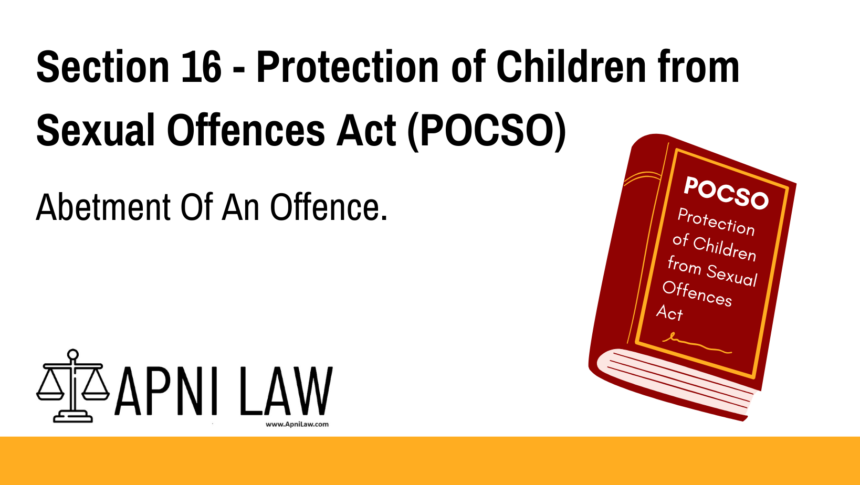Code: Section 16 POCSO Act
A person abets an offence, who—
First.—Instigates any person to do that offence; or
Secondly.— Engages with one or more other person or persons in any conspiracy for the doing of that offence, if an act or illegal omission takes place in pursuance of that conspiracy, and in order to the doing of that offence; or
Thirdly.—Intentionally aids, by any act or illegal omission, the doing of that offence.
Explanation I.—A person who, by wilful misrepresentation, or by wilful concealment of a material fact, which he is bound to disclose, voluntarily causes or procures, or attempts to cause or procure a thing to be done, is said to instigate the doing of that offence.
Explanation II.—Whoever, either prior to or at the time of commission of an act, does anything in order to facilitate the commission of that act, and thereby facilitates the commission thereof, is said to aid the doing of that act.
Explanation III.—Whoever employ, harbours, receives or transports a child, by means of threat or use of force or other forms of coercion, abduction, fraud, deception, abuse of power or of a position, vulnerability or the giving or receiving of payments or benefits to achieve the consent of a person having control over another person, for the purpose of any offence under this Act, is said to aid the doing of that act.
Explanation of Section 16 POCSO
Section 16 of the Protection of Children from Sexual Offences Act, 2012 defines “abetment” of an offence. Abetment is not limited to direct involvement in the offence but extends to any person who encourages, facilitates, or helps in the commission of a sexual offence against a child.
This section follows the general legal principle that anyone who plays a supporting or enabling role in the commission of a crime can be held equally liable.
The section covers three key modes of abetment:
- Instigating someone to commit the offence.
- Conspiring with others for the commission of the offence, where an act is done in furtherance.
- Aiding the offence by any act or omission.
The section includes detailed explanations, particularly highlighting that abetment may also involve deception, concealment, or misuse of power—especially in trafficking or exploitation contexts.
Key Provisions
- Abetment includes:
- Instigation
- Conspiracy (with resulting act or omission)
- Intentional aid (by act or omission)
- Explanation I: Misrepresentation or concealment of facts to cause the act also counts as instigation.
- Explanation II: Any act done to facilitate the crime is considered aiding.
- Explanation III: Exploiting or trafficking a child for the purpose of committing any offence under POCSO constitutes abetment.
Illustration
Example 1: Instigation
An individual persuades another to record and share obscene images of a minor. Even though they did not physically participate, their role in encouraging the act constitutes abetment through instigation.
Example 2: Conspiracy
Two people plan to traffic a child for sexual exploitation. One of them arranges transportation, and the other prepares a location. The actual crime is not yet committed, but an act in pursuance of the conspiracy has occurred. Both are liable under this section.
Example 3: Aiding Through Power or Influence
A hostel warden facilitates the entry of outsiders to access children, knowing the purpose. Even without directly committing the offence, they have aided the act through misuse of authority and omission.
Common Questions & Answers
1. What is the difference between abetment and direct commission of an offence?
Abetment involves supporting or facilitating the crime, not committing it directly. However, the punishment may still be severe depending on the nature and extent of the involvement.
2. Can a person be punished under POCSO for abetment even if the offence is not completed?
Yes. Even if the main offence is not completed, abetment—such as instigation or conspiracy with an overt act—can lead to punishment.
3. Does hiding facts or misleading someone count as abetment?
Yes. Under Explanation I, wilful concealment or misrepresentation to cause the offence qualifies as instigation.
4. Does this section apply to human trafficking?
Yes. Explanation III specifically addresses trafficking and coercive practices for child exploitation under the POCSO Act.
5. Can omission (not doing something) be treated as abetment?
Yes. Failing to act when there is a duty (especially in positions of authority) may be treated as intentional aiding.
Conclusion
Section 16 of the POCSO Act establishes that not just the principal offenders, but even those who indirectly support or facilitate crimes against children, are liable under the law. This wide definition of abetment ensures accountability for all forms of assistance in child sexual abuse, whether through action, conspiracy, or omission.
For more legal interpretations and updates on POCSO and child protection laws, visit ApniLaw.








